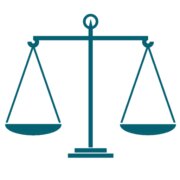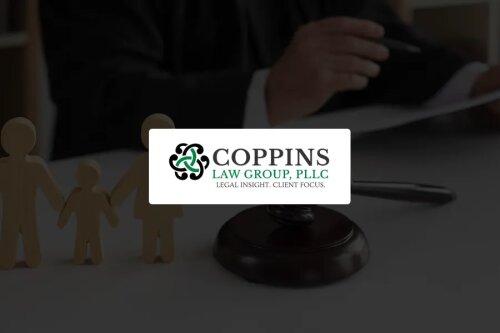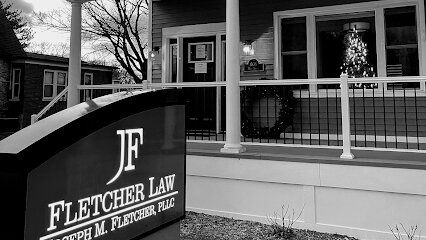Best Criminal Defense Lawyers in New York City
Share your needs with us, get contacted by law firms.
Free. Takes 2 min.
List of the best lawyers in New York City, United States
United States Criminal Defense Legal Questions answered by Lawyers
Browse our 1 legal question about Criminal Defense in United States and read the lawyer answers, or ask your own questions for free.
- Do you prosecute local Philippina for violating ESTAFA laws
- I was scammed by a lady presenting herself as my girlfriend.
-
Lawyer answer by mohammad mehdi ghanbari
HelloBased on the laws of the Philippines, you can file a criminal complaint against the person who scammed you for violating the laws on Estafa (swindling). Estafa is a criminal offense that involves defrauding another person of money or property...
Read full answer
United States Criminal Defense Legal Articles
Browse our 3 legal articles about Criminal Defense in United States written by expert lawyers.
- Clearing Your Record in Texas: 2026 Expunction Rules for US
- Criminal defense in the United States protects your rights from the moment of investigation through trial, sentencing, and appeals, and the stakes can include jail, fines, immigration consequences, and your future job prospects. You always have key constitutional rights: to remain silent, to have a lawyer, to be free from... Read more →
- Texas DWI Laws 2026 First Offense Penalties
- If you are arrested in the United States, you have the right to remain silent, the right to a lawyer, and the right to a fair trial - use those rights from the start. Criminal cases move quickly at the beginning: after arrest come booking, bail, your first court appearance,... Read more →
- Texas Bail Reform 2026: Why Bonds Are Harder to Secure in US
- If your loved one has just been arrested, move fast: confirm the exact charges, find out the bond amount, and contact a criminal defense lawyer immediately. In the United States, you have core rights at every stage - to remain silent, to an attorney, to reasonable bail (subject to exceptions),... Read more →
About Criminal Defense Law in New York City, United States
Criminal defense law in New York City covers offenses charged in state and federal courts within the five boroughs. It relies on the New York Penal Law to define crimes and penalties, and the Criminal Procedure Law to govern how cases proceed. Constitutional protections, such as the right to counsel, the presumption of innocence, and due process, shape every step from arrest to appeal.
In NYC, defense attorneys, paralegals, and investigators work with prosecutors from the District Attorney offices in each borough and with federal prosecutors when federal charges arise. The defense team’s role is to protect clients’ rights, assess evidence, challenge improper procedures, and negotiate outcomes that may include dismissals or plea agreements. Local practice often involves navigating arraignments, bail decisions, and potential pretrial release conditions.
Penal Law defines crimes and penalties in New York. The text is available from the official NY Senate: Laws PEN.
Criminal Procedure Law governs criminal process including arraignment, discovery, and trial rights. See the NY Senate page: Laws CPL.
Why You May Need a Lawyer
Below are concrete NYC-specific scenarios where retaining a criminal defense solicitor or attorney is essential. Each example reflects typical issues faced by residents in the five boroughs.
- Felony arrest in Manhattan or Brooklyn with bail concerns: A client may face high bail or restrictive release conditions after a violent offense or a serious property crime. An attorney can challenge the bail amount, request alternatives, and negotiate with prosecutors for pretrial release while preserving rights.
- Gun or weapons charges in Queens or the Bronx: NYC has stringent gun laws and enhanced penalties for possession or unlawful transfer. A defense attorney evaluates stops, searches, and chain of custody to challenge admissibility and build a technical defense.
- Domestic violence allegations in Brooklyn or The Bronx: Protective orders can restrict housing, contact, and child custody while criminal charges are pending. A lawyer helps safeguard rights, negotiate conditions, and pursue dismissal or reduced charges where possible.
- Drug possession or distribution cases in Harlem, Williamsburg, or Jamaica: The complexity of potential drug equivalence, paraphernalia evidence, and stop-and-frisk issues require careful suppression motions and credibility challenges to the prosecution’s case.
- Immigration consequences for NYC residents facing criminal charges: A conviction can affect lawful status or future relief options. An attorney coordinates with immigration counsel to assess risk and potential eligibility for relief or waivers.
- White-collar or financial crimes in Manhattan or Long Island City: Fraud, identity theft, or embezzlement charges demand thorough client interviews, document review, and evidence challenges to preserve business and personal interests.
Local Laws Overview
New York City criminal defense practice is guided by key state statutes and formal procedures. The major authorities below establish the framework for charging, trial, sentencing, and post-conviction relief.
- New York Penal Law (PEN) - Defines crimes and penalties across degrees and classes, including violent offenses, property crimes, and drug offenses. The Penal Law is the backbone for what prosecutors may charge and what defenses may apply. The current Penal Law text is available from the New York Senate: Laws PEN.
- New York Criminal Procedure Law (CPL) - Governs arrest procedures, arraignments, discovery, motions, trials, and post-conviction review. The CPL outlines defendants' rights at each stage of the case. The official CPL page is here: Laws CPL.
- New York Mental Hygiene Law (MHL) - Applies to mental health evaluations, competency to stand trial, and involuntary holds when mental health issues intersect with criminal proceedings. This law affects how cases proceed when a defendant has mental health considerations. See related resources on official NY sites: Laws MHL.
Recent trends and changes in the New York criminal justice landscape include adjustments to pretrial detention and bail rules, as well as ongoing reforms affecting how cases are charged and resolved. For authoritative context, see official government sources on Penal Law and CPL details, and consult local counsel for updates specific to your borough.
“Bail reform in New York limits pretrial detention for most offenses, with certain exceptions.” See New York’s official statutes and summaries at: Laws and Updates.
Frequently Asked Questions
The following questions reflect common concerns about criminal defense in New York City. They cover procedural, definitional, cost-related, timeline, qualification, and comparison topics.
What is a criminal defense attorney's primary role in NYC?
A criminal defense attorney protects rights, analyzes evidence, negotiates with prosecutors, and advocates for favorable outcomes for the client.
How do I choose a criminal defense lawyer in NYC?
Look for relevant experience, success in similar charges, client reviews, and clear communication. Schedule a consultation to assess fit.
What is the difference between a private attorney and a public defender?
A private attorney is hired by you or your family, while a public defender is appointed by the court if you qualify for legal aid due to income.
How much does a NYC criminal defense lawyer cost?
Costs vary by case complexity, geography, and attorney experience. Expect consultation fees, retainer agreements, and potential hourly rates.
Do I need a lawyer for a traffic ticket in NYC?
Most traffic tickets are civil penalties, but some violations and DWI cases are criminal. A lawyer can help negotiate or contest.
How long does a typical NYC criminal case take to resolve?
Resolution timelines vary widely by charge and court workload. Simple cases may resolve in weeks; complex matters can take months.
Can charges be dismissed or reduced in NYC?
Yes, through motions to suppress evidence, negotiated plea deals, or identification challenges, depending on the facts.
Do I qualify for bail or release before trial?
Eligibility depends on the charge, criminal history, flight risk, and safety concerns. A lawyer can argue for release conditions or recognizance.
Is it possible to seal or expunge a record in New York?
New York restricts expungement for most adult offenses, but some limited sealing and juvenile records relief may apply under specific conditions.
What should I bring to my first consultation?
Bring all charging documents, arrest reports, Miranda advisements, evidence, and a list of witnesses or alibis.
What is the difference between a plea bargain and going to trial?
A plea bargain resolves the case without a trial in exchange for concessions. A trial demands evidence and witnesses before a judge or jury.
Do I need a specialist for particular charges like gun offenses?
Yes. Gun offenses in NYC carry unique procedural and evidentiary issues that often require a specialist with local experience.
Additional Resources
Use these official organizations and government resources for reliable information and guidance on criminal defense in New York City.
- New York State Unified Court System - Official court system information, procedures, and public resources for criminal cases in New York. nycourts.gov
- New York State Division of Criminal Justice Services (DCJS) - State agency that collects crime statistics, maintains background check processes, and provides training for criminal justice professionals. criminaljustice.ny.gov
- The Legal Aid Society (NYC) - Nonprofit legal services provider offering criminal defense and related advocacy for indigent clients in New York City. legalaidnyc.org
Next Steps
- Identify your jurisdiction and charges by reviewing the arrest notice and complaint. Note the court location (Manhattan, Brooklyn, Queens, The Bronx, or Staten Island) and the next court date.
- Gather essential documents such as arrest records, charging papers, sworn affidavits, and any surveillance video or witness lists.
- Schedule initial consultations with 2-3 NYC criminal defense solicitors to compare experience and approach. Request a written estimate and retainer terms.
- Prepare a list of questions for each attorney about strategy, potential defenses, and expected timelines. Bring a copy of your documents to the meeting.
- Check credentials and disciplinary history through official channels such as the New York State Bar Association or the court system's attorney resources.
- Choose a defense solicitor and sign a retainer agreement. Confirm payment arrangements and communication expectations.
- Begin case preparation with your attorney, including witness interviews, evidence review, and pretrial motions as appropriate, with a realistic timeline.
Lawzana helps you find the best lawyers and law firms in New York City through a curated and pre-screened list of qualified legal professionals. Our platform offers rankings and detailed profiles of attorneys and law firms, allowing you to compare based on practice areas, including Criminal Defense, experience, and client feedback.
Each profile includes a description of the firm's areas of practice, client reviews, team members and partners, year of establishment, spoken languages, office locations, contact information, social media presence, and any published articles or resources. Most firms on our platform speak English and are experienced in both local and international legal matters.
Get a quote from top-rated law firms in New York City, United States — quickly, securely, and without unnecessary hassle.
Disclaimer:
The information provided on this page is for general informational purposes only and does not constitute legal advice. While we strive to ensure the accuracy and relevance of the content, legal information may change over time, and interpretations of the law can vary. You should always consult with a qualified legal professional for advice specific to your situation.
We disclaim all liability for actions taken or not taken based on the content of this page. If you believe any information is incorrect or outdated, please contact us, and we will review and update it where appropriate.
Browse criminal defense law firms by service in New York City, United States
New York City, United States Attorneys in related practice areas.

















